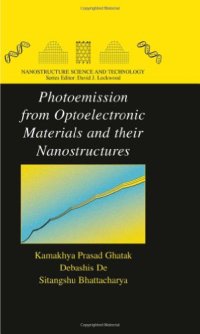
Ebook: Photoemission from Optoelectronic Materials and their Nanostructures
- Genre: Technique // Electronics
- Tags: Nanotechnology, Surfaces and Interfaces Thin Films, Materials Science general, Solid State Physics, Spectroscopy and Microscopy, Quantum Physics
- Series: Nanostructure Science and Technology
- Year: 2009
- Publisher: Springer-Verlag New York
- Edition: 1
- Language: English
- pdf
Photoemission from Optoelectronic Materials and Their Nanostructures is the first monograph to investigate the photoemission from low-dimensional nonlinear optical, III-V, II-VI, GaP, Ge, PtSb2, zero-gap, stressed, bismuth, carbon nanotubes, GaSb, IV-VI, Pb1-xGexTe, graphite, Te, II-V, ZnP2, CdP2 , Bi2Te3, Sb, and IV-VI materials. The investigation leads to a discussion of III-V, II-VI, IV-VI and HgTe/CdTe quantum confined superlattices, and superlattices of optoelectronic materials. Photo-excitation changes the band structure of optoelectronic compounds in fundamental ways, which has been incorporated into the analysis of photoemission from macro- and micro-structures of these materials on the basis of newly formulated electron dispersion laws that control the studies of quantum effect devices in the presence of light. The importance of the measurement of band gap in optoelectronic materials in the presence of external photo-excitation has been discussed from this perspective. This monograph contains 125 open-ended research problems which form an integral part of the text and are useful for graduate courses on modern optoelectronics in addition to aspiring Ph.D.’s and researchers in the fields of materials science, computational and theoretical nano-science and -technology, semiconductor optoelectronics, quantized-structures, semiconductor physics and condensed matter physics.
In recent years, with the advent of fine line lithographical methods, molecular beam epitaxy, organometallic vapour phase epitaxy and other experimental techniques, low dimensional structures having quantum confinement in one, two and three dimensions (such as ultrathin films, inversion layers, accumulation layers, quantum well superlattices, quantum well wires, quantum wires superlattices, magneto-size quantizations, and quantum dots) have attracted much attention not only for their potential in uncovering new phenomena in nanoscience and technology, but also for their interesting applications in the areas of quantum effect devices. In ultrathin films, the restriction of the motion of the carriers in the direction normal to the film leads to the quantum size effect and such systems find extensive applications in quantum well lasers, field effect transistors, high speed digital networks and also in other quantum effect devices. In quantum well wires, the carriers are quantized in two transverse directions and only one-dimensional motion of the carriers is allowed.